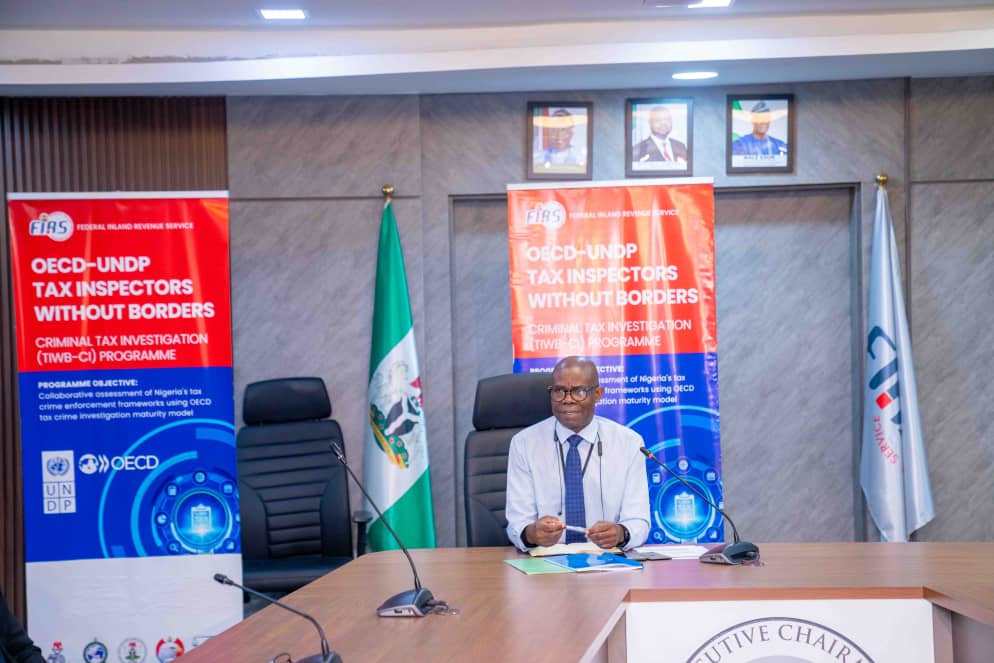Enhancing Nigeria’s Criminal Investigation Capacities to Combat Financial Crime: A Milestone Partnership between the Government of Nigeria and the UNDP-OECD Tax Inspectors Without Borders initiative.
July 25, 2024
When we think of tax crimes and corruption, we often view them as independent of the other. However, they are two sides of the same coin. Individuals and companies engaging in corrupt activities rarely report illicit earnings for tax purposes. Instead, they often inflate income from legitimate sources to launder their corrupt proceeds.
This makes cross-collaboration between tax authorities, law enforcement, and financial oversight agencies essential for effectively deterring, detecting, and penalizing these crimes.
What Needs to be Done?
Nigeria needs a coordinated approach to tackle tax crimes due to overlapping regulatory oversight. A critical step is fostering cooperation among parallel agencies through a comprehensive understanding of each agency’s functions, legislative powers, and their ability and willingness to collaborate.

To address this, the African Tax Administrators Forum (ATAF) has supported the creation of Tax Inspectors Without Borders for Criminal Investigations (TIWB-CI), a joint initiative of the UNDP and Organization for Economic Co-operation and Development (OECD). Effective collaboration through this initiative aims to reduce tax avoidance and evasion, providing the government with needed finance for investments in sustainable development goals (SDGs).
TIWB-CI’s key objectives are:
Facilitating knowledge sharing and skill development among tax authorities in developing countries.
Building the capacity of tax crime investigators through real-time assistance in criminal case investigations.
Strengthening tax crime enforcement frameworks to effectively resolve cases.
TIWB-CI will be rolled out in three phases over 24-30 months. Upon completion, its impact and achievements will be evaluated based on inputs from all stakeholders, following a standard evaluation framework.
A Landmark Beginning
Nigeria inaugurated TIWB-CI in May 2024, marking a significant step in its fight against tax crimes. This was followed by a two-day workshop on best practice procedures, setting the stage for a collaborative effort against tax-related crime.
The participating agencies include the Independent Corrupt Practices Commission (ICPC), Economic and Financial Crimes Commission (EFCC), Tax Appeal Tribunal, Nigeria Customs Service (NCS), Nigerian Financial Intelligence Unit (NFIU), Nigeria Police Force (NPF), with the Federal Inland Revenue Service serving as the focal point and secretariat.

Action Plan: A Blueprint for Success
The series of engagements between stakeholders resulted in the Gap Analysis and Action Plan Report, endorsed at a high-level debrief on 25th July 2024.
This action plan provides recommendations in three key areas for combating tax crimes:
Strengthening legal frameworks
Strengthening institutional frameworks
Strengthening operational frameworks for combating tax crimes.
This Action Plan is a strategic blueprint designed to revolutionize Nigeria’s approach to addressing tax crimes.

Looking Ahead
The UNDP Tax for SDGs initiative supports developing countries in increasing domestic resource mobilization and achieving the SDGs, with TIWB-CI as a pivotal programme. Following the completion of the Action Plan, the next phase of the TIWB-CI programme is the implementation of the recommendations in the action plans to enhance the capabilities of tax authorities, foster unprecedented collaboration, and pave the way for a future where tax crimes are effectively deterred, detected, and penalized appropriately.
Collaboration with Nigerian crime agencies positions the country for fair and equitable taxation practices. These will be crucial for implementing an action plan for a progressive improvement of institutional capacity as well as creating synergies since Nigeria operates a decentralized tax crime investigation system. By curbing illicit financial flows, TIWB-CI helps preserve government revenue, which can be reinvested in critical sectors for national development, especially the SDGs.


 Locations
Locations


